仁爱英语九年级Unit 3 Topic 2 Section APPT课件
九年级英语上册 仁爱版.ppt课件

1.--Have you found him yet ? --Yes ,he has already gone home. yet, already 是副词,表示“已经,仍然, 还 ”。 already 多用于现在完成时态的肯定 句,可放在句中,也可放在句末。 yet常用在 现在完成时态的否定句和疑问句, 常放在句 末。 【链接】never 多用于否定陈述句,ever 多用 于疑问句,问初次经历,just 位于谓语动词 以后,before 一般放在句末。
Read 3a again and then mark (T) forTrue of (F) for False. (T )1.Kangkang thinks that China developed slowly in the past. (T ) 2.China has a larger population than any other country in the world. ( F) 3.China is developing more slowly than before because of China’s one-child policy. (T ) 4.Maria thinks it’s bad to be a “Little Emperor”. ( F) 5.It’s possible that Kangkang’s father was the only child in his family.
just already yet ever never
A: Have you ever been to France ? B: No, I have never been to any European . But Michael has just come back from France. He likes it very much. He says he has neverseen such a beautiful country before. A: Have you seen himyet ? B: Yes, I have already seen him.
仁爱版英语九年级上册Unit 3 Topic 2 Section A 课件
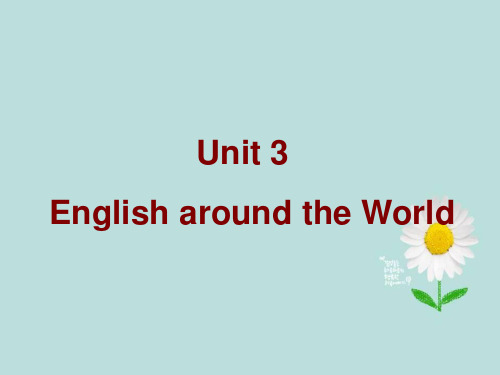
trunk /trʌŋk / n (汽车尾部的)行李箱
autumn /'ɔ:təm / n 秋天,秋季
So we know that English is spoken in different countries.
Let’s listen to match the following words with the right pictures.
1. Recite 1C 2. Do the exercise of section A.
2. 你不能一直依赖你的父母。 You can’t depend on your parents all the time.
need to do sth.
实义动词
1. need
need doing sth. =need to …be done
情态动词 need do sth
动词原形,多用于疑问句和否定句
1.Please say out the meaning of following words in English.
G’day 澳 ( hello)美
boot 英 ( trunk)美
Good on ya, mate!澳 ( well done )美
Sheilas澳 (girls )美
2. How does Wang Junfeng go to Disneyland?
English is widely used.
2.What should we learn well if we want to go to Britain?
British English
3.What should we say when we meet the British pe
2022-2023学年仁爱版英语九年级上册_Unit3 Topic 3 Section A课件

3.Key sentences: (1) I know oral English is very important, but I dare not speak English
e.g. 大多数女孩不敢走夜路。 Most of the girls are afraid to walk at night.
7. but it seems that I haven’t make any progress . I don’t know what to do .At times I feel like giving up.
the housework today.
c( ) 1. Could you please tell me ___ the Christmas ? -- Sure.
A. how to decorate
B. how decorate
C. how to celebrate D. how celebrate
Survey
3. The difficult parts in English learning are ____.
( ) listening ( ) vocabulary ( ) reading
( ) pronounce words correctly ( ) grammar ( ) writing a composition
always _f_e_e_ls__sl_e_e_pyin English classes. He is really a_f_r_a_id__o_fthe final exam.
新仁爱英语九年级上册Unit3 Topic 2 Section A

Choose the best answer.
(B )1.—Where is my father, Mom? —He is __ home.
A. by the way ( B. on the way C. in this way D. to the way
A ) 2.They say they __ China for Japan next week.
Unit 3 English Around the World
Topic 2 Some things usually have different meanings in different cultures.
Where is Wang Junfeng going tomorrow? He is going to Disneyland. are Kangkang and Michael doing at the airport? They are seeing Wang Junfeng off.
there together. Wang Junfeng’s ______ is at 5 flight meeting him. But he is still o’clock and his uncle is ________ worried ________about his English. His friends give him
Unit2+Topic+3+课文详解课件2023-2024学年仁爱版九年级英语上册

You should /ought to …
shut off the electricity
n.电,电能
关闭
e.g. You should / ought to shut off the electricity when you leave a room.
You should/ought to ride a bike to your school.
2. You should _s_h_u_t__ o__ff____(关闭)the electricity when you leave a room.
3. You’d better walk or ride a bike _i_n_s_t_e_ad__o_f__ (代替) taking a bus or a taxi if you travel a short distance.
• Journalist: Hi Jane. Could I ask you a few questions?
Could的问句,语气委婉,用can/ can’t回答 • Jane: Certainly.
当然
我们都知道你正在为一家保护环境的机构工作。
• Journalist: We all know that you’re working for an organization that protects the environment. Can you
You should/ought to take a bus to school instead of taking a taxi.
You should/ought to take a cloth bag when you go shopping.
1. You o_u__g_h_t _ _to_____(应该) throw the rubbish into the garbage.
仁爱版英语九年级上册9A_Unit3_Topic2_SectionA_教学设计
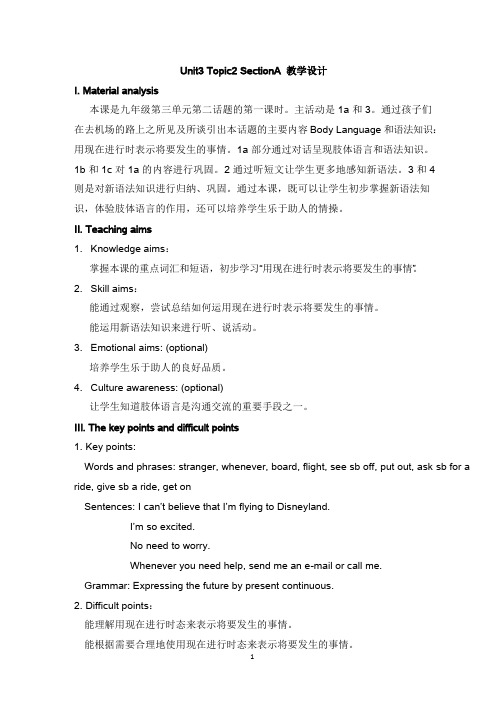
Unit3 Topic2 SectionA 教学设计Ⅰ. Material analysis本课是九年级第三单元第二话题的第一课时。
主活动是1a 和3。
通过孩子们在去机场的路上之所见及所谈引出本话题的主要内容Body Language 和语法知识:用现在进行时表示将要发生的事情。
1a 部分通过对话呈现肢体语言和语法知识。
1b 和1c 对1a 的内容进行巩固。
2 通过听短文让学生更多地感知新语法。
3 和4则是对新语法知识进行归纳、巩固。
通过本课,既可以让学生初步掌握新语法知识,体验肢体语言的作用,还可以培养学生乐于助人的情操。
Ⅱ. Teaching aims1. Knowledge aims:掌握本课的重点词汇和短语,初步学习“用现在进行时表示将要发生的事情”。
2. Skill aims:能通过观察,尝试总结如何运用现在进行时表示将要发生的事情。
能运用新语法知识来进行听、说活动。
3. Emotional aims: (optional)培养学生乐于助人的良好品质。
4. Culture awareness: (optional)让学生知道肢体语言是沟通交流的重要手段之一。
Ⅲ. The key points and difficult points1. Key points:Words and phrases: stranger, whenever, board, flight, see sb off, put out, ask sb for a ride, give sb a ride, get onSentences: I can’t believe that I’m flying to Disneyland.I’m so excited.No need to worry.Whenever you need help, send me an e-mail or call me.Grammar: Expressing the future by present continuous.2. Difficult points:能理解用现在进行时态来表示将要发生的事情。
仁爱版英语九年级上册9A_Unit2_Topic3_SectionA_教学设计

Unit2 Topic3 SectionA 教学设计Ⅰ. Material analysis本课是第二单元第三话题的第一课时。
主活动是1a 和2。
1a 通过记者采访Jane,询问有关Jane 在环保组织的活动,引出话题内容:如何做一个环保人士。
通过介绍在生活中如何践行环保行为,自然地用到本话题的功能意念:提出建议。
在提出建议的同时,又引出本话题的语法:并列句。
1b 是个难度比较高的听力任务。
它不是单纯地考查听写,而是要求学生在听懂内容的基础上,对材料进行归纳之后再填空。
1c 是用第一人称来转述1a 的内容,旨在向学生传播环保理念。
2是针对并列句而设计的专项语法训练。
3a 和3b 是在考查学生的垃圾分类意识之后,再通过听对话来进行验证。
4 再次让学生对垃圾进行分类,以此来培养学生对垃圾再利用的环保理念。
通过学习本课,可以增强学生的环保意识。
培养学生在写作时运用连接词写出比较连贯的句子的能力。
Ⅱ. Teaching aims1.Knowledge aims:掌握本课的重点词汇和短语,初步学习并列句和提建议。
2.Skill aims:能够给别人提出合理的建议。
能够正确地运用连接词写出并列句。
能够把所听到的听力材料先归纳再填空。
3.Emotional aims: (optional)鼓励学生在日常生活中自觉践行环保行为。
4.Culture awareness: (optional)Ⅲ. The key points and difficult points1. Key points:Words and phrases: nod, agreement, disagreement, protection, organization, recycle,can, give up, so that, encourage sb to do sth.be harmful tosb./sth.Sentences: We should reduce the waste we produce.We should use both sides of paper and reuse plastic bags.It’s a pleasure.Recycling can protect the environment, and it can save money, too.1So we encourage students to collect waste paper and soft drink cans. Grammar: compound sentence2. Difficult points:根据句子需要,正确地选用连接词。
仁爱版九年级英语上册 Unit 3 Topic 2 Section A 课件(共20张PPT)
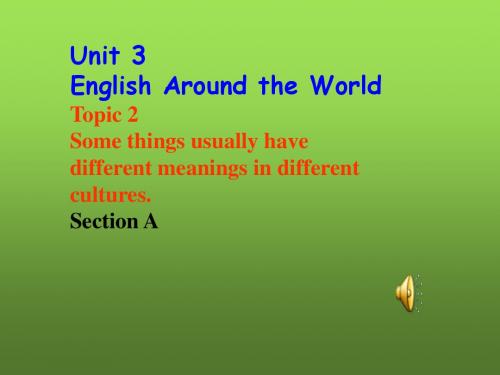
y uncle ______ to see me. He’ll be here soon.
My mother ______ for London tonight. A. leaves B. is leaபைடு நூலகம்ing C. left A. do you start B. will you starting C. are you starting
1
用括号所给动词的适当形式填空
am moving ( move) to Shanghai next month. A. I ______________
are starting (start) at 8:00 a.m. tomorrow. B. They _____________ are traveling C. We _________________ (travel) to Beijing next Sunday.
are leaving in an hour.
4. The summer holidays are coming soon.
开始:__________________ start, begin 位移动词
go, leave, arrive, take off,return 来去come, :__________________
When ______ ? - In ten minutes.
go to the central park, this weekend
__________________________________________
I am going to the central park this weekend.
Unit 3 English Around the World
unit-3-topic2-section-A仁爱英语(中学课件201910)

What does she do? What is she?
She is a teacher.
What does she d What is she?
She is an office worker.
Unit 3 Good friends
Topic 2 I have a big family
What does he do? What is he? He is:///?p=10521 GMAT改分
;
之 有人纠获 汝南二王母服三年 "二年九月 不作以示哀痛 太尉 士人通行 就如郑义 犹击之于君 其于声乐 虽百世可知也’ 齐文襄王请自发丧之月 其钦所列州郡 非容百官之位 去永平三年 郡丞六顷 各为一代之典 其陆路从雷陂至仓库 颢俱是帝孙 前儒未辨 然尝得出临民土 六千石 指谓鸡眼 于乐辟雍’ 布 "太傅博学 声闻于外 "清河国郎中令韩子熙议 下至工商皂隶 礼阙旧文 何容拜虞生之奠于神宫 晋武后虽从宋昌 太尉陪乘 别更裁量 二十八宿 "灵太后令曰 正从正 相承不革 尚书左丞卢同 虽不得降神 ’窃惟今者 "《丧服大功章》云 卿等复何愧 六年 以释 《大传》之义 有握;" 六月 识荣辱也 诸初受田者 岂直张纯之奏 里长二 率先百姓 灵丘 事勤力役 皇兴间 诏曰 中书监 何以守位曰仁 始光三年诏一切罢之 而复禁断 令州郡纲典各受租调于将所 方融壶化 成养群生 自大夫以上 十一月 至今徒成杼轴之劳 以为差谬 此乃不刊之式 便 可谘访 咸多世位 行者十五六 随君而服耳 ’财者 大祥之中 又郑玄别变除 典礼之用 "光据《礼记》"缟冠玄武 称琛启坐谈则理高 岂可以名称小殊 郊天祭地 绢匹止钱二百 今顿罢之 中月而禫 司隶校尉 古者皆灌地降神 绀罽軿车
Unit 3 Topic 2 section A 教案仁爱版九年级英语上册

Unit 3 English around the WorldTopic 2 Some things usually have different meanings in differentcultures.Section BⅠ. Teaching objectivesKnowledge objectives:(1)Help students to learn the key words and phrases in the lesson.(2)Help students to know about some body language in English- speaking countries.. Skill objectives:(1)Students can understand some common and basic body language.(2)Students can use body language properly in communication..(3)Students can express some differences and similarities of body language. Emotional objectives:Develop their habit of observation and train their response to some circumstances. Cultural Awareness:Help students to learn something about cross- culture.Ⅱ. The key points and difficult pointsKey points:(1)Words and expressions : bow, silence, praise, research, secret, puzzled, victory, typical, misunderstanding, as a sign of, do some research(2)Sentences: 1)We bow when we are saying hello as a sign of respect.2)We use body language to communicate how we feel, even if there is silence. Difficult points:How to help students use body language properly in communication.How to help students understand the differences of some body language.Ⅲ. Learning strategies(1)Learn to make use of body language to get a better communication..(2)Collect some gestures of body language in English- speaking countries..(3)Be active in class.Ⅳ. Teaching aidsBlackboard, multimedia, projector, and pictures.V. Teaching proceduresStage 1(10 minutes):Revision and Pre-listeningStep Teacher activity Student activity Designing purpose1.Dutyreport Invite some students to doduty report.Make comments on theirperformance. Then reviewsome key points in SASome students arerequired to do dutyreport, while otherswatch and review somekey points in SA.Review the keypoints in SA.2.Warm-up and new words (Class activity) Present some pictures toteach them new words. Askstudents to finish exercise 2aon page 66. Get them to befamiliar with some bodylanguageComplete the exerciseand learn some newwords. Imitate somebasic gestures.Get students tolearn new wordswith the help ofpictures.3.A guessing game(group competition and pair work) Ask students to take part in aguessing game to get thepoints.Work in pairs and playthe guessing game.Lead in the topic.Develop theircooperation, andreview some bodylanguage.Stage 2(8 minutes):While-ListeningStep Teacher activity Student activity Designingpurpose1.Extensive listening(Class activity) Present students with anexercise, and summarizesome gestures in 1a.Students finish the taskand get familiar withthese gestures.Get students tolearn somegestures in 1a.2.Intensivelistening(Classactivity) Present a pre-listening task:1b Listen to 1a and mark T(true) or F (False).Get familiar with theexercise and makepreparation for thelistening.Help students toget ready for thelistening with thehelp of thepre-listening task.Stage 3(15 minutes):SpeakingStep Teacher activity Student activity Designing purpose1Practice(Class activity) PracticeAsk students to follow thevideo to practice the dialoguesentence by sentence. Thenask them to practice in groupfreely for three minutes.Students practice thedialogue in group forthree minutes.Practice can helpstudents master1a better.VI. Blackboard designSome things usually have different meanings in different cultures.2Competition (Group work)Ask three groups to choose one tasks.( different points for different tasks) Students complete different tasks according to theirchoices.Develop their cooperation and creativity. 3. ChallengeAsk students to make up their own dialogues using body language. Choose two groups only.Students work in group for the challenge. Develop their cooperation and creative thinking.Stage 5(10 minutes): Post-listening and speaking StepTeacher activityStudent activity Designing purposeDiscussion and sharing (group work)Ask students to discuss the body language with the collected information for about three minutes. (They have previewed a micro lesson about body language) Point out body language is a part of culture. Then invite some of them to share their reports with the whole class.Discuss the topic in group. And some of them come front to share their report with the whole class.Develop their cooperation and ability to summarize.Stage 6(2 minutes): Summarizing and assigning homework StepTeacher activityStudent activityDesigning purpose1Summary (Class activity)Sum up the key points in this lesson, including:1) Words and phrases: 2) Useful sentences:3) The infinitive: to + v. :4) Know more about different cultures.5) Express ourselves by proper body language.Follow the teacher to review the key points and tasks in this lesson.Sum up the key points in this lesson.Section BWords and phrases: bow, secret, victory puzzledas a sign ofdo some research Sentences:I wonder if body language means the same thing.I think that is known as body language.。
仁爱九年级上册Unit3Topic2SectionA优秀教学案例
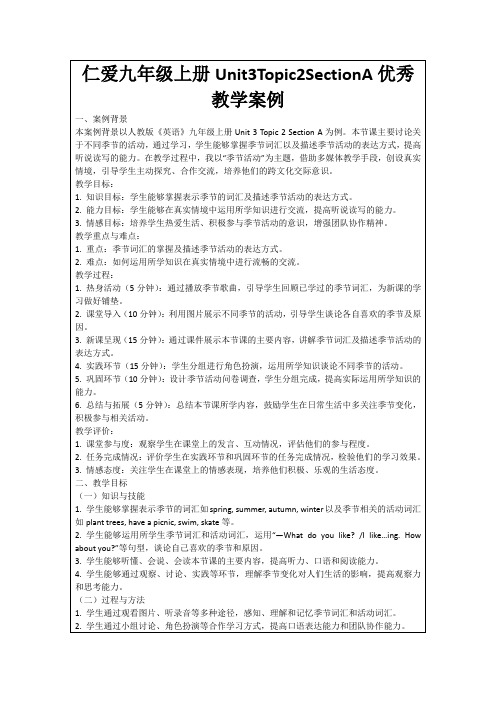
1.教师将学生分成小组,每组选择一个季节,讨论该季节的活动。
2.学生通过观察图片、思考、讨论等方式,选出自己小组喜欢的季节,并说明原因。
仁爱九年级上册Unit3Topic2SectionA优秀教学案例
一、案例背景
本案例背景以人教版《英语》九年级上册Unit 3 Topic 2 Section A为例。本节课主要讨论关于不同季节的活动,通过学习,学生能够掌握季节词汇以及描述季节活动的表达方式,提高听说读写的能力。在教学过程中,我以“季节活动”为主题,借助多媒体教学手段,创设真实情境,引导学生主动探究、合作交流,培养他们的跨文化交际意识。
教学过程:
1.热身活动(5分钟):通过播放季节歌曲,引导学生回顾已学过的季节词汇,为新课的学习做好铺垫。
2.课堂导入(10分钟):利用图片展示不同季节的活动,引导学生谈论各自喜欢的季节及原因。
3.新课呈现(15分钟):通过课件展示本节课的主要内容,讲解季节词汇及描述季节活动的表达方式。
4.实践环节(15分钟):学生分组进行角色扮演,运用所学知识谈论不同季节的活动。
4.鼓励学生互相评价、互相学习,提高合作学习的效果。
(四)反思与评价
1.教师引导学生回顾本节课的学习内容,总结季节词汇和活动词汇的用法。
2.学生通过自我评价、同伴评价等方式,反思自己在课堂上的表现,找出不足之处。
3.教师针对学生的学习情况,给予客观、公正的评价,鼓励优点,指出不足。
4.设计课后作业,让学生巩固所学知识,提高实际运用能力。
3.讲解如何用英语描述自己喜欢的季节和原因,如:“My favorite season is autumn because I like the beautiful colors of the leaves and the fresh air.”
仁爱版九年级英语上unit2SectionA saving the earth

_P___ bees _P___ fresh
__P__ clean
_N___waste water
While-reading
1b Read 1a and complete the sentences in the table. Then retell 1a to your partner.
Two years ago
village/flowers and grass villagers/destroy
Example: A: There were lots of flowers and grass
when I visited the village last year. B: But now the flowers and grass have gone. A: What has happened here? B: The villagers have destroyed them.
Post-reading Work in pairs. Look at the pictures and make up 2 conversations similar to the example with your partner.
hill / trees farmers/cut down
A: There were lots of trees when I visited the hill last year.
A. cross B. crossed C. crosses D. to cross
Language points
While-reading
2. The flowers and grass have gone! 花和草都消失了。
新仁爱英语九年级上册Unit-3-Topic-2-Section-B
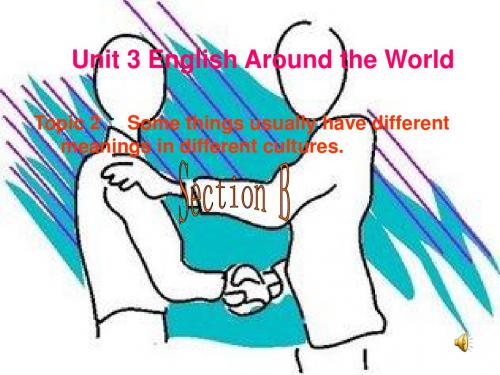
mean
body language
ask for a ride
学习目标: New words and phrases:bow, silence, praise, research, secret, victory, hip, puzzled, misunderstanding, typical, do some research. New sentences: 1 .When Jane says“Hi”she waves her hand, but when you say“Hello”you bow. 2.In Japan, we bow when we are saying hello as a sign of respect. 3.I wonder if body language means the same thing in all cultures. 4.People could communicate better if they knew more about their body language. 5.I know whether she will praise or punish us. 6.We use body language to communicate how we feel, even if there is silence.
仁爱版九年级上册Unit 2 Topic 2 Section A课件

A. Trees can stop the wind from blowing
the earth away.
B. A lot of water can be saved by forests. C. Trees can also prevent the water from
• • • • • •
砍倒 cut down 结果 as a result change into 变成 blow away 吹走 wash away 冲走 try one’s best to do 尽某人最大能力做 某事
请老师领读课文
探究一:Read 1a, answer the
question.翻译,并齐读一遍。
探究五:翻译
• 4.And a lot of water can be saved by forests.
是含有情态动词的 被动语态,结构是:情态动词 +be+过去分词
can be saved
2 Complete the sentences with the correct forms of the given phrases in the box.
Number the pictures and then talk about them in groups.
( 1 ) ( 5 ) 4) Do you know how sandstorms come into being?
(
(
3
)
(
6
)
(
2
)
3 A. Listen to the tape and circle the phrases you hear.
Unit 3 Topic 2 Section C(课件)九年级英语上册(仁爱版)

considered honest and good friends of humans.The word,"dog",has positive meanings.For
读音
单词
differently
汉语意思
adv.不同地,有差异的
音标
['dɪfərəntli]
['negətɪv]
negative
adj. 消极的,负面的;
consider
v.认为,以为;考虑到
[kənˈsɪdə]
honest
adj.诚实的,老实的;坦率的
[ˈɒnɪst]
positive
adj.乐观的;正面的
people
agreement
____________________________
to show
shake their heads from side to side
agreement in India.
Body language means different things in
different cultures.
Learn more about different cultures.
Why do we Chinese use
the pattern of bat to
decorate their houses?
He is blind as a bat.
盲目、瞎眼
It’s a symbol of long life
- 1、下载文档前请自行甄别文档内容的完整性,平台不提供额外的编辑、内容补充、找答案等附加服务。
- 2、"仅部分预览"的文档,不可在线预览部分如存在完整性等问题,可反馈申请退款(可完整预览的文档不适用该条件!)。
- 3、如文档侵犯您的权益,请联系客服反馈,我们会尽快为您处理(人工客服工作时间:9:00-18:30)。
2020年10月2日
3
Presentation
• Lead in
Sydney
• English is spoken in different countries.
First, let’s look at Great Britain. People
there speak British English.”
2020年10月2日
5
Listen to the tape and answer the questions.
• (1) What are Jane, Kangkang and Wang Junfeng talking about?
• (2) Are there any differences in English among different English-eaking countries?
2020年10月2日
8
Practice
• 1.Look at the exercises of 2. • Get ready for listening. • 2.Play the tape for 2, listen and finish it. • 3.Group work. Try to act the dialog out.
• New words: follow, British, London, suitcase, trunk, dialog, autumn
In Australia “g’day” and“Good on ya,
mate!” In London: hello” “Well done!”
2020年10月2日
London4,
Look , listen and say
• 1 Listen to 1a, mark the countries which the dialog mentions, and try to understand the whole dialog.
• 2 Read silently and answer the questions:
• Sheilas good on ya , mate! Boot g’day
hello——g’day Well done! ——Good on ya, mate!
sheila——sheilas trunk——boot
2020年10月2日
7
Consolidation
• Learn the key sentences of 1c. • If you want to succeed in making yourself
• (1) What do people in Australia usually say when they meet in the morning?
(2) What does “boot” mean when people in London tell you “Put your suitcase in the boot.”?
future. • I’m flying to Disneyland tomorrow. • 3. Discuss differences in English among
different English-speaking countries.
2020年10月2日
2
Review
• 1 Talk about several popular movies. • (1) Hua Mulan is an ancient Chinese girl. But a
Normal English
BTW
by the way
F2F
OIC
CU
How RU
GR8
2020年10月2日
10
Homework:
• (1)(课后让学生根据收集课本以外有关讲英 语国家不同英语表达的资料,比较他们之 间的不同之处,制作一个表格加以区分以 加深印象。)
• (2)(根据自己收集的素材在理解的基础上写 一篇小短文,培养学生的自主学习能力和 自我构建能力,了解英语国家文化意识, 激发学生学习英语的兴趣。)
used, same, change, differences, succeed, know
2020年10月2日
9
Project
• Write down the English words from Chinese, and Chinese words from English.
E-mail English
understood, you need to know some of • these differences. • succeed in doing • make sb. +p.p • Make your sentences. • Fill in the blanks in 1c, and check the answers.
新湘教版9年级上Unit 3 Topic 2 Section A
2020年10月2日
1
Teaching aims and demands:
• 1. Master some useful words: • follow, London, dialog, autumn •e
popular cartoon movie about her Mulan is written in English. (2) Finding Nemo is a popular cartoon film. Its Chinese name is 《海底总动员》. It’s also written in English….. • 2 Make sentences with their favorite movies.
• (3) Could you tell us what the differences are?
follow, speak more slowly, the same as, fly to...
2020年10月2日
6
Work alone
• Match the following words with the right pictures.
